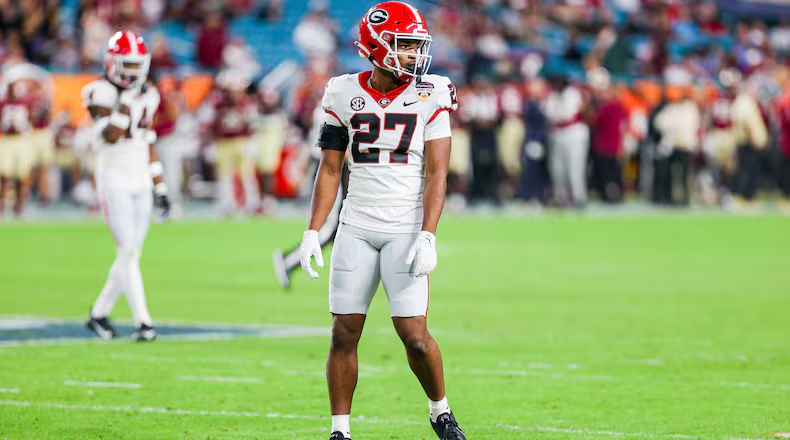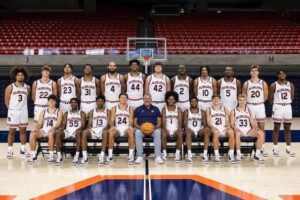
Another Departure: Defensive Back Enters Transfer Portal, Adding to Georgia’s Spring Exits
The Georgia Bulldogs football program has experienced further roster adjustments this spring as another defensive back has decided to enter the NCAA transfer portal. This marks the fourth player from the defensive secondary and the fourth Bulldog overall to seek opportunities elsewhere since the conclusion of the 2024 season and the commencement of spring practice. While the identity of the departing player has not yet been officially disclosed by the university or the player himself, sources close to the program have confirmed the development, adding to the ongoing narrative of roster fluidity in the ever-evolving landscape of college football.
This latest entry into the transfer portal will undoubtedly prompt further discussion and analysis among Georgia faithful and college football observers alike. The Bulldogs, coming off a successful season that saw them compete at the highest level, now face the task of navigating these personnel changes as they gear up for the challenges of the upcoming 2025 campaign. Head Coach Kirby Smart and his staff have consistently demonstrated an ability to adapt and reload, and this spring’s transfer activity will be another test of their recruiting prowess and developmental capabilities.
The transfer portal has become an increasingly significant factor in college football roster management. It allows student-athletes to explore other programs without having to sit out a season, provided they meet certain criteria. This freedom has led to a dynamic environment where players seek opportunities for increased playing time, a different coaching philosophy, or a program that better aligns with their personal and athletic goals. For universities, the portal can be a double-edged sword, offering a chance to add experienced talent quickly while also posing the risk of losing valuable players.
For Georgia, the departure of a fourth defensive back this spring raises questions about the depth and experience in that unit heading into the fall. The defensive secondary is a critical component of any successful football team, requiring a blend of athleticism, intelligence, and communication. The Bulldogs have traditionally prided themselves on a stout defense, and the coaching staff will be working diligently to ensure that this standard is maintained despite the recent departures.
It’s important to consider the various factors that might lead a player to enter the transfer portal. Playing time is often a primary motivator. With a program as talented and competitive as Georgia, earning significant snaps can be challenging, especially for younger players or those facing stiff competition at their position. A player might feel that their development would be better served in a program where they have a clearer path to the field.
Beyond playing time, coaching philosophy and scheme fit can also play a role. A player might find that their skills and strengths are not being optimally utilized within the current defensive system. Exploring other programs with different approaches could be seen as a way to maximize their potential and showcase their abilities to NFL scouts.
Personal reasons can also contribute to a player’s decision to transfer. Factors such as proximity to family, academic programs, or overall campus environment can influence a student-athlete’s choice of institution. While football is a significant part of their lives, these personal considerations can often weigh heavily in their decisions.
The fact that four defensive backs have entered the portal this spring might suggest a specific dynamic within that position group. It could indicate a high level of competition where players perceive limited opportunities, or it could be related to specific coaching decisions or scheme adjustments that have influenced players’ roles and outlook. Without official statements from the players or the program, any such analysis remains speculative.
However, it is worth noting the track record of Coach Smart and his staff in both recruiting and developing defensive talent. Georgia has consistently attracted top-tier recruits on the defensive side of the ball, and they have a proven ability to mold and prepare players for success at the collegiate and professional levels. The coaching staff will undoubtedly have been proactive in identifying and developing players who are ready to step up and fill the roles vacated by the departing individuals.
The transfer portal also presents an opportunity for Georgia to potentially add talent to their roster. While the focus will likely be on the players currently within the program, the coaching staff will be aware of potential additions who could provide immediate help or valuable depth at positions of need. The timing of these decisions is crucial, as the transfer portal has specific windows during which players can enter, and there are also deadlines for enrolling and being eligible to play in the upcoming season.
The spring practice period is a critical time for all college football programs. It provides an opportunity for coaches to evaluate their personnel, experiment with different lineups and schemes, and begin to establish the foundation for the upcoming season. For players, it’s a chance to showcase their progress, compete for starting roles, and solidify their place within the team. The backdrop of transfer portal activity adds another layer of complexity to this process.
For the players who have entered the portal, the next steps will involve exploring their options, connecting with other programs, and ultimately making a decision about their future destination. This process can be both exciting and challenging, as they weigh various factors and seek the best fit for their athletic and academic aspirations.
Meanwhile, at Georgia, the focus will remain on the players who are present and committed to the program. The coaching staff will emphasize the opportunities that now exist for those who may have been waiting in the wings. This is often a chance for younger players to step into more prominent roles and for those who have been contributors to further solidify their importance to the team.
The impact of these transfers on Georgia’s depth chart will become clearer as the offseason progresses. The coaching staff will likely use the remaining spring practices and the summer months to assess their options and make any necessary adjustments. They will also be actively recruiting to ensure that the program maintains its high standards of talent and competition across all positions.
It is important for fans and observers to remember that roster turnover is a natural part of college football in the transfer portal era. While the departure of multiple players at a single position might raise concerns, it is also an opportunity for others to emerge and for the program to evolve. Coach Smart has consistently preached a “next man up” mentality, and this situation will undoubtedly put that philosophy into practice.
The specific skills and experience that the departing defensive backs brought to the program will be evaluated, and the coaching staff will be looking for players who can replicate or even enhance those qualities. This could involve players with similar skill sets who have been developing within the program, or it could lead to a reshuffling of personnel and the exploration of different defensive alignments.
The strength of Georgia’s recruiting classes in recent years provides a degree of reassurance that there is talent waiting for its opportunity. The Bulldogs have consistently signed highly-rated defensive backs who possess the athleticism and potential to excel at the highest level of college football. The spring and summer will be crucial for these players to demonstrate their readiness to contribute.
Furthermore, the leadership within the defensive unit will be important in navigating these changes. Veteran players will need to step up and provide guidance and stability for the younger players who are stepping into larger roles. The coaching staff will also rely on their experienced assistants to ensure that the defensive backfield remains a cohesive and effective unit.
The transfer portal, while sometimes perceived negatively by fans who dislike seeing players leave, is also a reality of modern college football that programs must navigate strategically. It requires constant evaluation of the roster, proactive communication with players, and a willingness to adapt to changing circumstances.
For Georgia, the focus remains on competing for championships. The standards within the program are exceptionally high, and these roster adjustments will be viewed as another challenge to overcome on the path to achieving their goals. The coaching staff’s ability to manage the transfer portal effectively, both in terms of retaining key players and strategically adding talent when needed, will be a crucial factor in their continued success.
As the spring unfolds, more information will likely emerge regarding the identity of the departing defensive back and the potential impact on the team. Coach Smart will undoubtedly address these changes at some point, providing insights into the program’s approach to roster management and their confidence in the players who remain.
In the meantime, the focus within the program will be on the ongoing development of the current roster. Spring practice is a time for growth, evaluation, and the establishment of roles for the upcoming season. The players who are on the field are the ones who have the immediate opportunity to shape the future of the team.
The Georgia Bulldogs have a long and storied tradition of defensive excellence. While the departure of players is never ideal, it also creates opportunities for new chapters to be written and for new heroes to emerge. The coaching staff and the remaining players will be determined to ensure that the defense continues to be a strength of the team in the 2025 season.
The transfer portal era demands resilience and adaptability from both players and programs. For the departing defensive backs, it represents a chance to seek new opportunities and pursue their goals in a different environment. For Georgia, it is a reminder of the constant need to recruit, develop, and adapt in the ever-changing landscape of college football. The story of the 2025 Bulldogs defense is still being written, and the coming months will reveal how these roster adjustments shape their journey. The program’s history suggests that they will meet these challenges head-on and strive to maintain their position among the nation’s elite.





